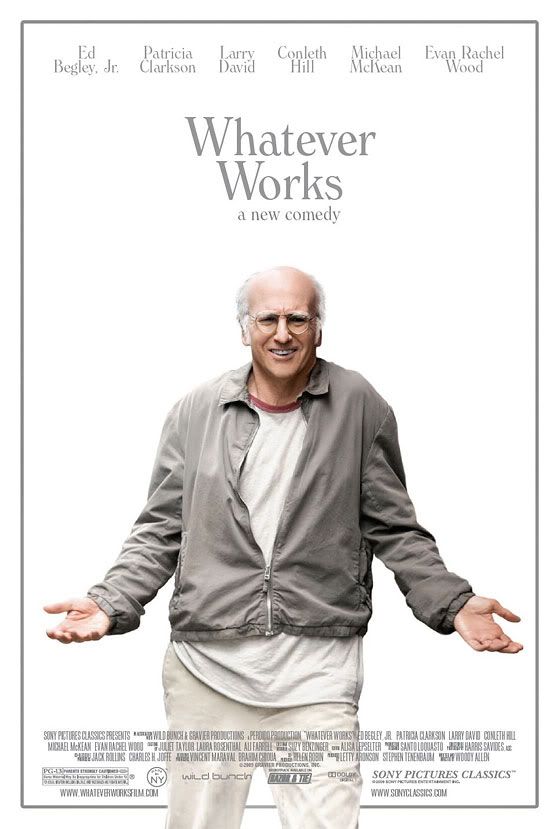
Showing posts with label Comedy. Show all posts
Showing posts with label Comedy. Show all posts
Wednesday, May 6, 2009
Simplicity Works
The poster has arrived for Woody Allen's next film, Whatever Works. There is a lovely simplicity in the singular image of a very casual Larry David just waiting for whatever to happen.


Wednesday, March 11, 2009
Whatever It Is, I'm Against It!
A few weeks ago, I reacquainted myself with the films of the Marx Brothers. I hadn't watched them in about a decade and as they proceeded to leave me in paroxysms of laughter, I wondered why I waited so long. I had planned to write a post about Groucho, Harpo, Chico and Zeppo but it's difficult to articulate what makes them so utterly charming and effortlessly funny. So instead, I spent this evening grabbing some clips from YouTube that will hopefully do the work for me. If you like what you see below, please go rent or buy Monkey Business and Duck Soup, two excellent starting points for this team that produced the kind of laughs they just don't make anymore.
Sunday, October 26, 2008
Don't Worry, Be Poppy
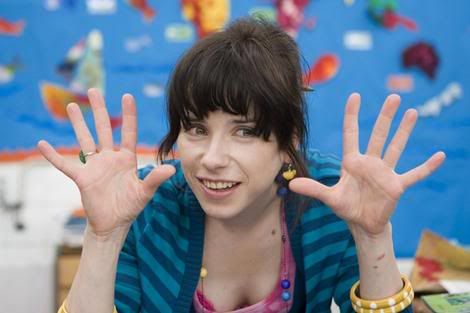
Director Mike Leigh, best known for his emotionally wrought dramas such as Vera Drake and Secrets & Lies, takes a 180-degree turn with his latest film, Happy-Go-Lucky. An unabashed burst of sunshine, Leigh’s lead character is Poppy, a 30 year old grade school teacher with a nearly manic thirst for life. Always eager to put a smile on someone’s face or listen to a problem, Poppy floats through her days content with living the same way she did at twenty years old. Leigh finds all of this oh so charming, and hopes the audience takes Poppy’s approach to life to heart as well, finding something winning in her unrestrained good nature and take-it-as-it-comes-with-a-smile-on-your-face attitude.
Unfortunately for Leigh, Happy-Go-Lucky veers dangerously close to being a tourism trip to the lower classes to celebrate their exotic ways. Poppy and her flatmate seem to live a life that is an extended version of a slumber party, as they walk around in old PJs, hang out together in their bedrooms and order take out. Poppy is also, conveniently, a grade school teacher where her amped up happiness can only prove to be an asset. However, a major sequence in the film has Poppy, her younger sister and her roommate heading out to the suburbs to visit her older sister. Pregnant, married and living in a new house with a yard, Leigh scripts her as haughty and condescending of Poppy’s lifestyle. The notion Leigh puts forth is that it’s inconceivable of somebody in the suburbs being truly happy the way Poppy is. It’s simplistic at best and borderline offensive at worst, suggesting that even though Poppy is lower down the food the chain, her lack of responsibilities somehow grant her a magical potion for a stress-free lifestyle. Leigh doesn’t see that there is a middle ground. There are many single people and couples with “adolescent” impulses, that also manage to balance mortgages, children and savings.
In an interview with the Hour, a weekly Montreal newspaper, Leigh states that the film is about "...the way ordinary people without privileges just get on with things, or don't, as the case may be. It's an anti-miserablist film, we are destroying ourselves and each other and the planet, and there's much to be gloomy about, but there are people out there getting on with it." What Leigh seems to not understand is that "ordinary people" "get on with it" because they have to. Poppy's life as a single woman with no children and a steady job, simply isn't representative of "ordinary people" and it's a major flaw that prevents Happy-Go-Lucky from gaining any kind of insight into the true workings of the lower or middle class. If Leigh had chosen a single mother, or a family with both parents working and raising children, it would've been a truer representation of what so-called "ordinary people" do to "get on with it". But he plays it safe and familiar, giving the audience a digestible, quirky British girl to tell them to smile and be happy with their lot. Which, to put it in British terms, is a whole lot of rot.
Thursday, October 23, 2008
Woody's Barcelona
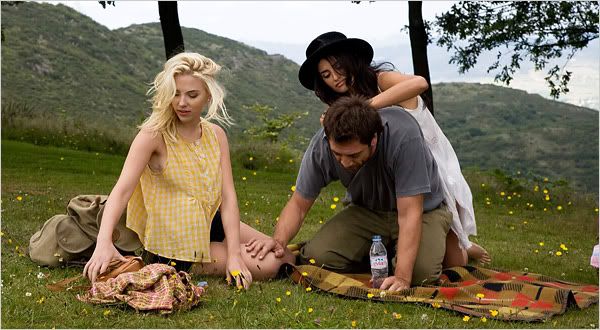
For the better part of three decades, Woody Allen has been New York City’s unofficial biographer, capturing with a lover’s eye, that magical city's elusive allure as he wound his characters through the streets that never sleep. Who can forget the brilliant series of black and white still shots that open Manhattan; the architecture tour in Hannah & Her Sisters or the numerous apartments, theaters and parks that tracked a relationship in Annie Hall. It seemed impossible to think of Woody Allen even considering shooting in another city. But while European audiences continued to support Allen, the quintessentially American filmmaker couldn’t seem to find an audience at home, and in 2005 Allen crossed the Atlantic where funding and support were more readily available.
Match Point, Allen’s triumphant return to critical acclaim, marked the first of three films shot in England. While both Match Point and Cassandra’s Dream were exercises in morality, and Scoop a nostalgic take on classic comedy tropes, Vicky Cristina Barcelona vaults itself over any genre specifications and into the canon of Allen’s finest accomplishments. Moreover, it finds Allen training his camera with the same lingering sense of longing and beauty that he would in New York City, on the landmarks of Barcelona and provincial Spain.
Needless to say, I’ve been looking forward to this film all year, but even I could not have anticipated what an accomplishment Vicky Cristina Barcelona is. On the surface, the traditional Allen themes of romanticism versus pragmatism, art versus commerce and the sources of artistic inspiration are all to be found here. But what unfolds is something richer that taps deep into the well of the sacrifices that are made for passion and comfort, wrapped in a remarkable package that is by turns hilarious and sober.
Best friends Vicky (Rebecca Hall) and Cristina (Scarlett Johannson) are on vacation in Barcelona. Vicky is due to marry her thoroughly bland fiancee Doug upon her return to New York City, while Cristina is simply drifting, caught in a state of post-graduation uncertainty. One night at dinner, they are very openly propositioned by Juan Antonio (Javier Bardem), an artist who suggests they all spend the weekend together in the country, take in the sights, have some good food and of course, sleep together. The buttoned down Vicky is appalled, while Cristina is intrigued. They end up deciding to go with Juan Antonio, but with no guarantee of sex. Of course, both girls end up falling for Juan Antonio and from there, without spoiling the film for anyone, the wheels are put in motion for a very interesting summer.
Allen seems to have relished his time in Bareclona and Spain, as he scatters the film with shots of Gaudi’s famous buildings, the colorful alleyways of metropolitan Barcelona, and with a honey glazed lens, finds the soul of rural Spain, with simple shots of storefronts and quiet landmarks that left my fellow audience members literally gasping. But beneath these shots, and just visible under the dual love triangles that make up the film, is a very sophisticated script that offers up a progressive view of artistic relationships (both romantic and professional), that considers what each person brings into a situation, and makes quiet argument that sometimes multiple partners are needed to maintain the balance of sexual, artistic and emotional needs. It’s an intriguing logic, and certainly very “European”, but it’s all the more remarkable in that it’s coming from a man who is at an age when most directors and writers have long retired. It’s inspiring to find a director who is still working out new angles on familiar themes, with the intelligence many in the industry half his age simply lack.
Vicky Cristina Barcelona was more than worth the wait, and it ranks with Allen’s finest films. Funny and heartwarming, it’s a wonderful journey that doesn’t offer simple solutions for the lives of artists, but humbly suggests, without judgment, that the paths chosen are the ones best for the individual (or individuals) involved.
Labels:
Comedy,
Drama,
Javier Bardem,
Penelope Cruz,
Romance,
Scarlett Johansson,
Woody Allen
Thursday, August 21, 2008
Vicky Cristina Montreal?

It seems for the second time this year, Montreal cinemas have been robbed of Woody Allen’s latest film. This spring, I waited anxiously for Cassandra’s Dream to appear on cinema screens in the city. I go to the theater once a week and on three separate occasions I had seen the trailer for the film, with the logo for Montreal based distributor Metropole Films preceding the ad. Unfortunately, the film never materialized. Now, with glowing reviews, a stellar cast including Javier Bardem, Penelope Cruz and Scarlett Johansson, and one of the widest opening screen counts in his career, Woody Allen is again getting the cold shoulder from Montreal cinemas. Being in Quebec, Montreal film openings occasionally fall a week behind North American opening dates as the province’s byzantine and bizarre language regulations (generally) dictate that a dubbed or subtitled version of English films must also be available concurrently. But now, the second week after its opened, Vicky Cristina Barcelona is still nowhere to be seen in the province. This situation is even more bizarre as Woody Allen & His New Orleans Jazz Band were one of the featured artists of the Festival International De Jazz De Montreal this summer, playing two high-profile, sold-out (and expensive) shows.
To be fair, Woody Allen’s two previous films, the critically acclaimed Match Point and the underrated Scoop, had dismal runs in the city, barely lasting three weeks before being pulled. Adding to the confusion is that some smaller or independent films will often have separate Quebec based distributors handle the film, rather than the studio handling the rest of the North American rollout. But as the jazz festival has amply indicated, there is still a strong interest in the man and his films, and there should be no reason why Vicky Cristina Barcelona is not being put on at least one screen in this city.
The Weinstein Company who is handling the film’s distribution, in the face of weathering bad press and less than stellar box office returns from its recent slate of films, is perhaps playing it safe by landing this film in markets where it is sure to do well. But surely a Quebec distributor can step up and acquire the rights for this province? Is Woody Allen’s clarinet playing really more popular than his films in Montreal?
Sunday, February 3, 2008
The Savages (Tamara Jenkins, 2007)
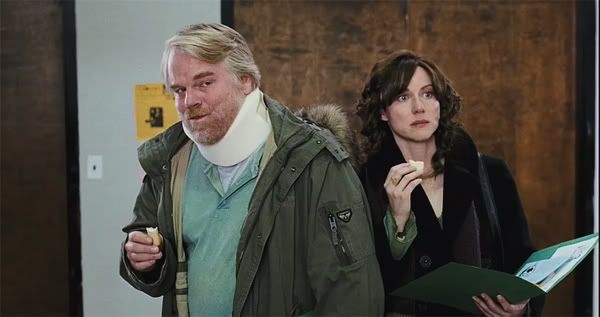
There is a key moment in the final third of Tamara Jenkins' beautifully crafted The Savages, when a student asks her theater teacher, and Bertolt Brecht devotee Jon Savage (Philip Seymour Hoffman) what the difference between plot and narrative is. It's a sly wink on behalf on Jenkins, who also wrote the screenplay, as her second full length feature quietly and confidently side steps a traditional story arc for something far more organic.
The film traces the difficult decision of siblings Jon and Wendy Savage (Laura Linney) to place their aging father, who is suffering from dementia, into a nursing home. Still dealing with the effects of a less than perfect childhood in which their mother left and their father never seemed to be present, Jon and Wendy struggle to balance their feelings of the past to deal with the present situation. While the subject matter is serious, the tone is appropriately much more complex. Jenkins' intelligent screenplay, is by turns hilarious and heartbreaking, and thankfully avoids self indulgent hand wringing, big dramatic speeches or an overwrought message, favoring illuminating moments found in the smallest of spaces.
As the film progresses, the somewhat estranged Jon and Wendy form a quiet bond as they care for their father. Both deliriously intelligent (anyone with a remote knowledge of liberal arts college courses will chuckle at many of the references peppered throughout), with a shared love of the theater, their time together also brings to the surface some harsh and at times similar realities about their personal lives. It isn't long before a tentative, unspoken alliance is made with a quiet support and respect for each other.
There are no reconciliations or easy answers here. As their father slips further away into his disease, there is hard fought acceptance and a desire by Jon and Wendy to at least try and connect with him before he's gone. Their efforts are genuine and at times touching, but always leavened by the fact that their father's time is almost up. Time passes, and a small part of each of them grows up a little more. No, they haven't quite figured out all the angles yet of their personal lives, and maybe they never will, but with a new found effort to stay connected, the Savages realize that sometimes family are the only ones who can understand you.
Labels:
Comedy,
Drama,
Laura Linney,
Philip Seymour Hoffman,
Tamara Jenkins
Friday, January 18, 2008
Juno (Jason Reitman, 2007)
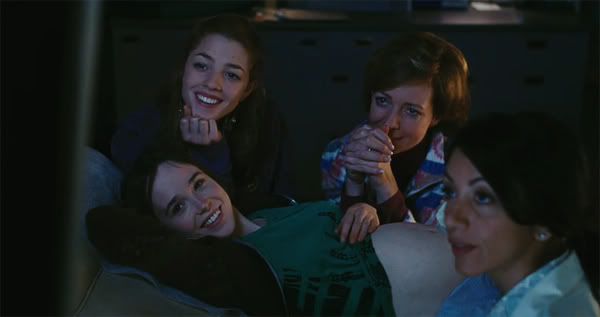
As Juno continues to build box office earnings, buzz and undoubtedly works toward a couple of Oscar nominations, the talk of the internet has been of first time screenwriter Diablo Cody, and film's quirky dialogue. As many reviews, both positive and negative, have pointed out Cody's dialogue is, depending on the writer's point of view, either unique and eccentric or annoying and unrealistic. Roger Ebert has weighed in on the debate stating in his Answer Man column, "Movie characters don't talk like real people. If they did, they'd drive us nuts."
To take Ebert's point further, movie characters have almost never talked "realistically". From the tough talking mugs of classic gangster films, to the speed talking antics of screwball comedies and even to the level headed dialogue of political and police procedurals and dramas, dialogue is always stylized to both entertain and forward the plot. Even films or television shows which are praised for their "realism" are still stylized to a certain degree, highlighting linguistic elements to heighten comedic or dramatic effect. In the case of Juno, I saw neither brilliance nor contrivance. What Cody has done, admirably, is capture the rapid fire wit of a too smart teen within the milieu of her friends. I found it no different than the tangents my friends and I can run into which weave music references, inside jokes and off-color puns. Anyone who might overhear us might just have the same reaction they did upon the opening minutes of the film. And it is a reaction that I too had upon the first fifteen or so minutes of the film. But as the film progressed I fell into the rhythms of the dialogue and walking out of Juno I knew the next time I saw the film the dialogue wouldn't be an issue.
Oh yeah, but is the film good?
In short, yes. If the first two-thirds of the film are enjoyable, if somewhat familiar, Diablo Cody earns the various kudos she has received with the final act of her film. As the plot - which follows the path of a pregnant teenager who decides to give the child to a couple who can't conceive - rolls along with genuine laughs, it's the growth of Juno (played with alarming authenticity by Ellen Page) and the surprising depth Jason Bateman and Jennifer Garner bring to their roles of the expecting, desperate parents that elevates the film. Cody takes makes some interesting, original choices with her characters in the final portions of the film that turns Juno from a comedy about pregnancy, into a film about parenting and how as we grow up, we don't get smarter, we just gain more experience. It's up to us to use that experience, to make smart choices. And if the dialogue isn't realistic, the heart of the film is, and that is what makes it a joy to watch.
Subscribe to:
Posts (Atom)


